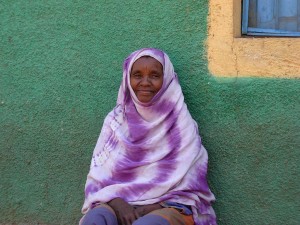
Women manage family health in Ethiopia.
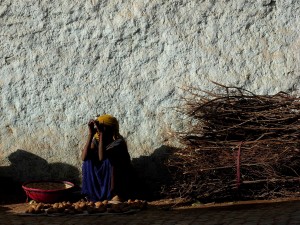
Pics by M. Sayagues
A Saudi woman journalist escaped punishment last week but her cameraman wasn’t so lucky.
Rozana Al-Yami, 22, was pardoned by Saudi Arabia’s King Abdullah after the court sentenced her to 60 lashes for her work at the talk show Red Line in LBC, a Lebanese satellite TV.
[...]]]>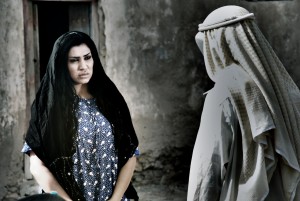
Shall we talk about it?
A Saudi woman journalist escaped punishment last week but her cameraman wasn’t so lucky.
Rozana Al-Yami, 22, was pardoned by Saudi Arabia’s King Abdullah after the court sentenced her to 60 lashes for her work at the talk show Red Line in LBC, a Lebanese satellite TV.
She made international news. He didn’t. No one mentioned that he has to serve a two-month jail term. His name remains anonymous in press reports.
Some would call this positive discrimination in favour of women but to me iit s a general bias. Women have been striving all over the world for equality, not favoritism.
Of course , Al-Yami doesn’t deserve to be punished. Neither does the cameraman nor anyone involved in the TV show that grabbed the hearts of million of Arab viewers but disturbed the conservative image of Saudi Arabia.
Let’s talk about sex
Sex remains a big taboo but the Arab world is opening up its airwaves to the topic. The LBC’s Red Line wasn’t the only TV show that tackles sex but there are few others. Be surprised: sex topics such as pleasure sex and organism that used to be discussed secretly by women during friendly gatherings are now discussed on air through many regional TV Channels.
One of the most popular talk show is Love Tales, by Dr Fawziya Duree, showing every Saturday on a private Kuwaiti Channel. Dr Duree holds a PHD in sex, culture psychology and believes in the need to discuss sex as an ordinary and important matter in life.
Her program started with a new, fresh approach to discussing marital problems and love relationships.
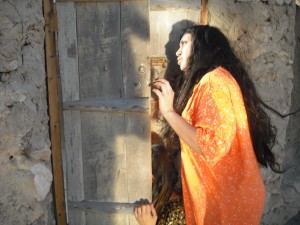
Sex talk: opening the door to freedom.
After gaining huge popularity, she shifted to more daring topics, such as sex during menstruation (a taboo among Muslims), passionate kissing and the anatomically correct description of genital parts.
In each show Dr Duree boldly discusses bold sex-related topic and receives calls from viewers calling for help in their sex-related conflicts. Although those programmes are opposed by hardliners, they are gaining popularity day by day.
Love Tales can be seen in Saudi Arabia. Let’s spare a compassionate thought for the poor cameraman jailed for something he could do freely in other Arab countries.
Images from the movie Anklet Dancer, Bharain 2008. Courtesy of director Ali Al ALi.
]]>Burqa-wearing women may lose the right to drive in Bahrain over a conflict between government and conservative lawmakers.
The government wants to amend the traffic law and grant male traffic officers the right to ask women to lift the veil and show their faces.
On the other [...]]]>
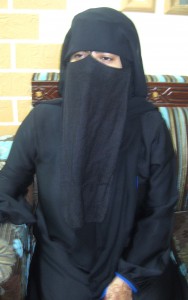
Dressed to drive? By S.Hamada
Burqa-wearing women may lose the right to drive in Bahrain over a conflict between government and conservative lawmakers.
The government wants to amend the traffic law and grant male traffic officers the right to ask women to lift the veil and show their faces.
On the other hand, some lawmakers are loath to approve the amendment or at least demand that female traffic officers be employed for this task.
Let’s hope that in either way it will be a win-win situation for women: that they will continue to drive, and enter a job sector that has been reserved for men since the 1970s. Bahrain doesn’t impose a dress code on women. Wearing a burqa (or Niqab, in Bahrain) is a personal choice.
OK, not all women here wear a burqa as personal choice; some do it to obey their male relatives or conservative families. Whatever the reasons, burqa limits women’s social and professional activities. For example, they cannot eat at restaurants without closed cabins nor work in many sectors except those with limited, female-only jobs.
Anyway, women who feel comfortable wearing a burqa shouldn’t be discriminated or underestimated. Females worldwide should be allowed to speak their minds, lead their lives to the fullest and freely practice their faiths.
Forcing women to take off their burqa is as cruel as forcing the veil on them.
A measure of independence
Burqa-wearing women in Bahrain have one important right – they can drive.
This is fairly new. Before 2006, burqa-wearing women drivers were harassed by traffic officers and fined.
In 2006 the government allowed burqa-clad drivers as a result of pressure from conservative MPs, who represent the majority of the Lower House, with the proviso that these women should, if requested, show their faces to traffic officers, for security reasons.
Not all were pleased with that decision. A Bahraini columnist, Abdullah Al Ayobi, argues that, for security reasons, fully covered women should not drive. He wrote last year that Bahrain was the only country in the world that allows unidentified individuals to drive.
Being able to drive has made life easier for women, especially with Bahrain’s poor public transportation.
We will soon know whether burqa-wearing women will continue to drive legally in Bahrain.
]]>Instead of striking a balance between ambition and realism, the MDGs have become [...]]]>
Instead of striking a balance between ambition and realism, the MDGs have become “money-metric and donor-centric”, “meaningless catch-all phrases.”
So says Jan Vandemoortele, a Belgian national, a United Nations senior official and one of the architects of the MDGs, in a thought-provoking article in the July issue of Development Policy Review of the Overseas Development Institute. (read it here)
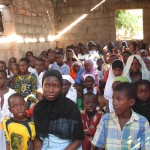
Unrealistic goal? A crowded classroom in Guinea Bissau...
The author recalls that the MDGs were set up in 2000 as collective targets based on extrapolations of global trends. They are vague by definition; they are not one-size-fits-all.
Instead, one should look at countries’ historical backgrounds, natural endowments and specific problems, then adapt the Goals to each circumstance, as Mozambique, Cambodia and Ethiopia have done.
Otherwise, this puts undue pressure on the poorest countries and, given that most of these are in Africa, nurtures Afro-pessimism.
For example, the global target for education “is not realistic” for countries in conflict, he says.
True, targets do change. For example, water for all in 2015 morphed into the more feasible goal of halving the number of people without clean water.
Magic numbers
A mantra has evolved: if only there were more money and higher economic growth, the MDGs would be achieved. Who is fond of these “magic numbers”? Staff at global headquarters of aid organisations, says the author, because of their “excessive reliance on abstract concepts.” (he should know, with his long career as a top UN official).
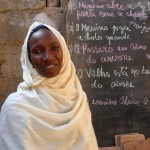
..and their teacher. By M. Sayagues
Vandemoortele sees the MDG canon being usurped by interest groups to push their agendas or devalued “as a repackaged call for more foreign aid.”
Rather, the MDG should be a tool to examine disparities and inequities within countries. In his view, the poorest people continue to be excluded. Many of these are women. Without better sex-disaggregated data, the gender dimension of hunger, illiteracy, disease and poverty remains unexposed.
Most progress takes place among the better off, and inequality and inequity keep rising, says the author.
“The targets are often presented as a universal good that will not demand tough policy choices and hard trade-offs among social groups within a country,” he says.
The MDGs should usher in new thinking about inequalities if they are not to miss the point
What do you think? Send us your views.
]]>Some of those championing Caster Semenya’s cause accuse those wanting to sex-test Caster of imperialism and racism (as well as sexism). Others plead to wait before reaching a verdict, arguing that the realities of sex testing are enormously complex
Firstly to address the issue of terminology, over which [...]]]>
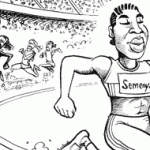
Courtesy of Zapiro, Mail & Guardian
Some of those championing Caster Semenya’s cause accuse those wanting to sex-test Caster of imperialism and racism (as well as sexism). Others plead to wait before reaching a verdict, arguing that the realities of sex testing are enormously complex
Firstly to address the issue of terminology, over which there seems to be confusion. Gender is the dominant society’s views on how women and men should look, behave, what roles they should play in society, how they should perform and frequently what rewards they receive – hence gender inequity. This has usually led to lower status and discrimination against girls/women but has increasingly been seen as limiting the options and potentially harming boys/men too.
Gender is not a politically correct term for sex. Sex testing would be just that – establishing whether a person is biologically female or male. So gender testing is not the term that should be used this case, but sex testing.
Secondly, to tackle the science issue, as this tends to obscure the real issue of gender stereotyping and discrimination so evident in this case. Professor Tim Noakes, an international sports science expert says the issue of ‘unfair advantage’ which is the only thing that should be at play here as it is in the case of drug use,is simple to establish.
He states that the issue that needs to be clarified here is whether the person concerned is a man masquerading as a woman or not. This could be established by a simple physical examination “handled within the usual constraints of the doctor/patient domain – not in the public domain” as has happened in the harmful manner in which the IAAF has handled this.
As for the rest, he says, there is great variation. All other possible tests including chromosome testing is indeterminate and so that should be left well alone. The calls for more to be done in dealing with
this issue and await judgment are therefore erroneous and cloud the issue in a shroud of inappropriate so-called scientific enquiry.
Sissies and butch
The third issue relates to what lies at the heart of the matter, social norms. While issues of racism and imperialism have and will continue to apply in various circumstances and have a sensitive history in terms of
women’s bodies, particularly in Africa, focusing on these issues in the current context obscures the much neglected ‘elephant in the room’ - gender discrimination. Comments within the press and on talk shows are
unwittingly guilty of this same problem in placing ‘blame’ at Athletics South Africa or her coach’s door.
They argue that the authorities should have pre-empted this situation, given her prior experiences (at the hands of the teachers, members of the public and previous authorities). ‘Pre-empting the situation’ would fall prey to the exactly these same prejudices – pandering to what people perceive to be ‘normal’ for girls or women.
This is akin to what might have happened during the apartheid era where actions may have tried to stave off racism by negotiating black people’s entry into racially reserved sporting or cultural events before the
time.
Many white girls who do not ‘look’ as society expects will tell similar humiliating stories of being stopped from entering female public toilets or being questioned as to whether they male or female.
At the core of this issue are ideas about gender – how girls/women and boys/men look and behave and perform (in this case perhaps a young woman winning by 2 seconds ahead of the field is not seen as ‘normal’).
This is what has been so hard to address locally in South Africa, despite our progressive constitution, due to deeply held dominant ideas about what is ‘female’ and ‘male’. It is these ideas and actions that promote gender discrimination. This leads to men, who in societies’ terms do not look ‘masculine enough’, being called ‘sissies’ and women who look not ‘feminine enough’ being labelled ‘butch’.
At the root, gender discrimination
In our own society, this has led to violent attacks on some women and in our own and other countries to violent attacks on some boys/men. This is what we need to clearly point as underlying this case and name it for what it is. Framing the discrimination as racism or imperialism without reference to gender discrimination as the main issue risks reinforcing gender stereotypes.
Societies have a long way to go in terms of changing the dominant ideas on how women and men should look and behave and perform, and in some cases, dress – and allow for variations in ‘looks’ and roles to be
underpinned by what people would like to be and do, rather than societies’ current dominant expectations.
There are many excellent organisations in our own country and abroad that have worked with women and men on this issues, but as it is all to obvious from this and other cases, much work is still needed for these choices and this freedom to take root in the broader society as a whole.
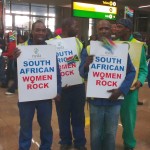
Supporters at the airport. Photo: Marion Stevens
Caster should not be having to deal with a world controversy over her win. She should be unreservedly basking in the glory of her and our incredible victory. No doubt she has experienced this humiliation and discrimination at other levels before and has become somewhat hardened to its effect, but we wish her, her friends and her family strength in dealing with this blatant gender discrimination.
As Caster Semenya and our other gold medal winner, Mbulaeni Mulaudzi, return home – congratulations on your amazing wins and Caster, you have our ful lsupport. For the rest, to Caster’s detractors or apologists, hang your heads in shame for not ‘naming’ the issue for what it is and for perpetuating gender stereotypes and discrimination in her individual case and in society as a whole.’
As we once again approach the 16 days of activism against violence against women, let us bear these issues in mind and not mouth platitudes in our struggle against gender inequity and discrimination.
Diane Cooper – Director, Women’s Health Research Unit, School of Public
Health and Family Medicine, University of Cape Town
Leslie London, Director, School of Public Health and Family Medicine,
University of Cape Town
Nomfundo Eland , Treatment Action Campaign (TAC) Women’s Rights Campaign
Larissa Klazinga and Rhodes Gender Action Project
Lisa Vetten, Tshwaranang Legal Advocacy Centre to End Violence Against Women
Nomfundo Eland, TAC Women’s Rights Campaign
Shirley Walters, University of Western Cape, South Africa
Lillian Artz, Director, Gender, Health and Justice Unit, University of Cape Town, South Africa
Glenn de Swardt, Health4Men
Jane Harries, Associate Director, Women’s Health Research Unit,
University of Cape Town
Jennifer Moodley, Women’s Health Research Unit, University of Cape Town
Sheila Meintjes, Political Studies Department, Wits University
Ilse Ahrends, the Saartjie Baartman Centre for Women and Children
Phumi Mtetwa,the Lesbian and Gay Equality Project
Marion Stevens, Health Systems Trust
Sipho Mthathi, Human Rights Watch South Africa.
Deborah Byrne, Foundation for Human Rights (FHR)
Sumaya Mall, Women’s Health Research Unit, University of Cape Town
Ntobeko Nywagi, Women’s Health Research Unit, University of Cape Town
Sheila Cishe, Women’s Health Research Unit, University of Cape Town
Chelsea Morroni, Women’s Health Research Unit, University of Cape Town
Phyllis Orner, Women’s Health Research Unit, University of Cape Town
Regina Mlobeli, Women’s Health Research Unit, University of Cape Town
Mary Jansen (KIWIA) Khoe San Indigenous Women in Action
Angelica Pino, Gender-based Violence Programme, Centre for the Study of
Violence and Reconciliation
Shireen Hassim, University of Witwatersrand, South Africa
Linda Cooper, Centre for Higher Education and Development, University
of Cape Town
Akosua Adomako Ampofo, Inst. of African Studies and Head, Centre for
Gender Studies & Advocacy, University of Ghana, Legon
Cathy Mathews, Medical Research Council
Fareeda Jadwat, African Gender Institute, University of Cape Town
Ilse Ahrends,Saartjie Baartman Centre for Women and Children, South
Africa
Di McIntyre, NRF chair, Health Economics Unit, University of Cape Town
Andrea Rother, Centre for Occupational and Environmental Health
Research, University of Cape Town
Carol Thomas, thewomanspace
Johanna Kehler, Director, AIDS Legal Network, South Africa
Carrie Shelver, People Opposing Women Abuse, South Africa
Gabi Jiyane, the Lesbian and Gay Equality Project
Balise Mahlangu, the Lesbian and Gay Equality Project
Ayanda Rapita, the Lesbian and Gay Equality Project
Gertrude Fester, Feminist Forum/ Women’s and Gender Studies,University
of Western Cape
Naeemah Abrahams, Gender and Health Research Unit, Medical Research
Council, South Africa
Angelica Pino, Gender-based Violence Programme, Centre for the Study of
Violence and Reconciliation, South Africa
Pamela Scully, Women’s Studies and African Studies, Emory University &
Deputy Editor, Women’s History Review
Mary Jansen (KIWIA) Khoe San Indigenous Women in Action
Melissa Steyn, Department of Sociology, University of Cape Town, South
Africa
Gabi Jiyane,the Lesbian and Gay Equality Project
Marion Heap, Health and Human Rights, School of Public Health and
Family Medicine,University of Cape Town
Balise Mahlanguthe, Lesbian and Gay Equality Project
Bernadette Bredekamp, Division of Family Medicine, University of Cape
Town
Ayanda Rapita, the Lesbian and Gay Equality Project
Larissa Klazinga and Rhodes Gender Action Project
Laura Pollecutt, South Africa
Sokari Ekine,London
Natasha Primo
Alex Kent
Annemarie Hendrikz
Jon Weinberg, Cape Town
Eva Hunt, South Africa
Shirley Gunn, Cape Town
Susan Holland-Muter, South Africa
Tara Weinberg, Cape Town Lavona George, South Africa
Gille de vlieg, South Africa
Michael Weinberg, Cape Town
Anne Schuster, South Africa
Jenny Radloff, South Africa
Kathy Watters, Cape Town
Sakina Mohamed, South Africa
Nicolene McLean, Gender Action Project
Carla Tsampiras, Rhodes History Dept
Corinne Knowles, GENACT
Alan Kirkaldy, NTESU
Thava Govender, Human Development Consulting Agency,KZN, South Africa
Richard Matzopoulos, Medical Research Council and UCT Public Health
Bernedette Muthien, Engender
Sally Gross,Intersex South Africa
Surplus People Project, South Africa
Sharon Stanton, S.L Stanton Attorneys
Tessa Lewin, Communications Manager, Pathways of Women’s Empowerment,
Institute of Development Studies, UK
Nisaa Institute for Women’s Development
What happens when the relatives of the murdered confront their murderers? What happens if they have to live with the murderers?
This is the theme of “My neighbour, my killer”, a film about Rwanda’s extraordinary attempt at reconciliation. This documentary by Anne Aghion, which premiered in New York two weeks ago at the [...]]]>
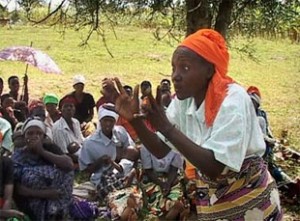
Remembering in Rwanda. Courtesy Anne Aghion
What happens when the relatives of the murdered confront their murderers? What happens if they have to live with the murderers?
This is the theme of “My neighbour, my killer”, a film about Rwanda’s extraordinary attempt at reconciliation. This documentary by Anne Aghion, which premiered in New York two weeks ago at the Human Rights Watch film festival, follows a gacaca or community court during five years.
Rwanda has set up some 12, 000 gacaca where killers face the relatives of those they killed during the genocide in 1994. (Read an interview with Aghion here).
A world and an age away, the same questions emerge in “Katyn”, the magnificent, sombre and sober epic movie made in 2008 by Polish director Andrzej Wajda about the Soviet massacre of 20,000 Poles during World War 2. During the ensuing five decades of occupation of Poland, the Soviets falsified history in a web of institutional lies and blamed the Nazis for the mass murders.
Both films are meditations on memory and history and their distortions, on loss, cruelty and forgiving, on imperfect justice, atonement and healing.
Women are central to both films – they are witness to horror and keepers of memory.
Think of the Madres de Plaza de Mayo haunting the Argentine junta with the photographs of their disappeared sons and daughters in the 1980s.
Gendering truth, gendering abuse
At truth and reconciliation commissions across the world, the bulk of testimonies by women dwell more on their loved ones and less on their own sufferings.
This is changing, as truth commissions become more gender-aware and seek gendered narratives. Earlier commissions, such as Argentina and Chile, were gender-neutral (some say gender-blind). South Africa was gender-neutral in its mandate but had special hearings for women. Peru’ commission had a gender unit. Later ones, like Haiti, Sierra Leone and Timor Leste, have looked specifically at sexual violence.
And more: the International Criminal Tribunal for Rwanda and the International Criminal Tribunal for the Former Yugoslavia have ruled that mass rape, sexual assault, sexual slavery, forced prostitution, forced abortion and forced pregnancy may be crimes against humanity, torture and genocide.
A third film that I saw recently is “Persepolis”, Marjane Satrapi’s wildly popular graphic novel turned animated movie, about her life growing up as a girl who likes Michael Jackson and punk music under the ayatollahs in Iran in the 1980s.
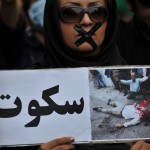
Protesting in Tehran. Photo: M. Avazbeigi
Its charming animation overlays a dreadful national and family history of imprisonment, torture, disappearances, failed revolutions, dashed political hopes, war and Shariah.
The movie conveys a poignant description of another form of gender abuse: the repression of women’s freedom to dress, move about, work, study, divorce, inherit, love and have fun.
Repressed, but not cowed into submission: as I write, on the streets across Iran, women are protesting, being beaten up, arrested and killed, challenging theocracy, demanding their rights.
(Read about women protesters in Iran and about dismantling a culture of impunity in Guatemala, Peru and Democratic Republic of Congo)
]]>